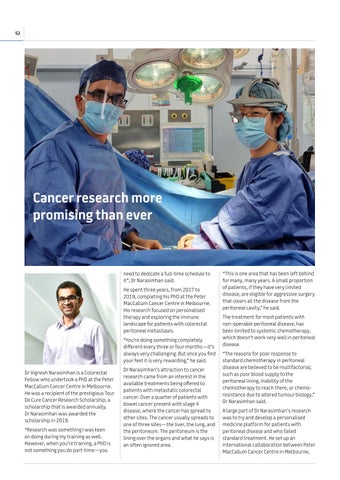52
Cancer research more promising than ever
need to dedicate a full-time schedule to it”, Dr Narasimhan said. He spent three years, from 2017 to 2019, completing his PhD at the Peter MacCallum Cancer Centre in Melbourne. His research focused on personalised therapy and exploring the immune landscape for patients with colorectal peritoneal metastases. “You're doing something completely different every three or four months—it’s always very challenging. But once you find your feet it is very rewarding,” he said. Dr Vignesh Narasimhan is a Colorectal Fellow who undertook a PhD at the Peter MacCallum Cancer Centre in Melbourne. He was a recipient of the prestigious Tour De Cure Cancer Research Scholarship, a scholarship that is awarded annually. Dr Narasimhan was awarded the scholarship in 2019. “Research was something I was keen on doing during my training as well. However, when you're training, a PhD is not something you do part-time—you
Dr Narasimhan’s attraction to cancer research came from an interest in the available treatments being offered to patients with metastatic colorectal cancer. Over a quarter of patients with bowel cancer present with stage 4 disease, where the cancer has spread to other sites. The cancer usually spreads to one of three sites—the liver, the lung, and the peritoneum. The peritoneum is the lining over the organs and what he says is an often ignored area.
“This is one area that has been left behind for many, many years. A small proportion of patients, if they have very limited disease, are eligible for aggressive surgery that clears all the disease from the peritoneal cavity,” he said. The treatment for most patients with non-operable peritoneal disease, has been limited to systemic chemotherapy, which doesn't work very well in peritoneal disease. “The reasons for poor response to standard chemotherapy in peritoneal disease are believed to be multifactorial; such as poor blood supply to the peritoneal lining, inability of the chemotherapy to reach there, or chemoresistance due to altered tumour biology,” Dr Narasimhan said. A large part of Dr Narasimhan’s research was to try and develop a personalised medicine platform for patients with peritoneal disease and who failed standard treatment. He set up an international collaboration between Peter MacCallum Cancer Centre in Melbourne,


























